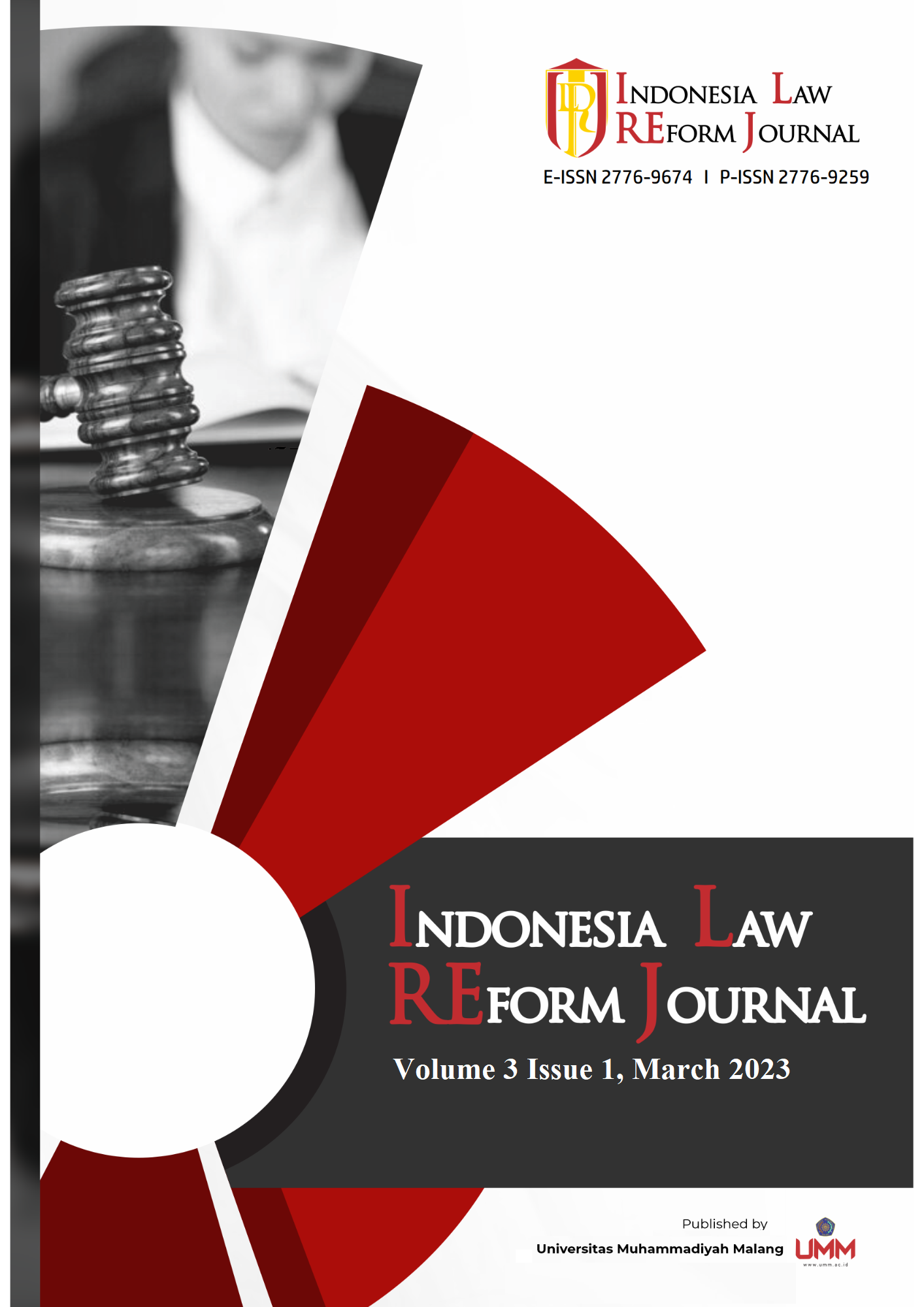Pluralism and Equality in the Perspective of Human Rights in Indonesia
DOI:
https://doi.org/10.22219/ilrej.v3i1.24205Keywords:
Plurality and Equality, Human Rights, DemocracyAbstract
Abstract
In the context of Indonesia's plural society, where the demand for pluralism is increasingly urgent during the democratic transition, it often raises questions about how the implementation of the principle of equality can be the foundation of democracy and the fulfillment of human rights. The purpose of writing is to analyzehow society respects pluralism/equality as part of the fulfillment of citizens' rights in a democratic country. The research method used is normative juridical by referring to legal norms contained in the constitution and legislation. The aim of the research is to identify the important dimensions that the state must consider in realizing pluralism and equality from the perspective of human rights in Indonesia. Moreover, it aims to demonstrate that in a diverse society, religious tolerance in the effort of developing religious life can still run harmoniously, dialogically, and tolerantly in the present modern Indonesia era. This is especially important for Indonesia, as it has the fourth-largest population in the world. Therefore, the presence of the state in supporting the multicultural democratic society is highly needed.
Keywords: Plurality and Equality; Human Rights; and Democracy.
Abstrak
Dalam konteks masyarakat Indonesia yang plural, di mana tuntutan akan paham kemajemukan semakin mendesak pada masa transisi demokratisasi, sehingga kerap kali mengimbulkan pertanyaan bagaimana penerapan prinsip kesetaraan dapat menjadi landasan perjuangan demokrasi dan pemenuhan hak asasi manusia. Pertanyaan tersebut itulah yang menjadi fokus riset ini, yakni meneliti tentang bagaimana tatanan masyarakat menghormati kemajemukan/kesetaraan sebagai bagian dari pemenuhan hak-hak warga negara dalam sebuah negara demokrasi. Metode penelitian ini menggunakan metode Yuridis Normatif yaitu dengan mengacu pada norma-norma hukum yang terdapat dalam konstitusi dan peraturan perundang-undangan. Tujuan penelitian mengetahui dimensi-dimensi penting yang menjadi perhatian negara dalam mewujudkan kemajemukan dan kesetaraan dalam perspektif hak asasi manusia di Indonesia. Lebih dari itu, juga hendak menunjukkan bahwa dalam ranah masyarakat majemuk, toleransi agama dalam upaya pengembangan kehidupan beragama tetap berjalan harmonis, dialogis, dan toleran dalam era Indonesia moderen sekarang ini. Apalagi Negara Indonesia dengan jumlah populasi penduduk terbesar ke 4 di dunia. Maka dari itu, kehadiran negara dalam rangka menopang pilar masyarakat demokratis multikultural sangat diperlukan.
Kata kunci: Kemajemukan dan Kesetaraan, Hak Asasi Manusia dan Demokrasi.
Downloads
References
Arisman, Ismardi. “Meredam Konflik Dalam Upaya Harmonisasi Antar Umat Beragama.” Toleransi 6, no. 2 (2014): 200–222. https://doi.org/http://dx.doi.org/10.24014/trs.v6i2.907.
Benuf, Kornelius, and Muhammad Azhar. “Metodologi Penelitian Hukum Sebagai Instrumen Mengurai Permasalahan Hukum Kontemporer.” Gema Keadilan 7, no. 1 (2020): 20–33. https://doi.org/10.24246/jrh.2019.v3.i2.p145-160.
Budijanto, Oki Wahju, and Tony Yuri Rahmanto. “Pencegahan Paham Radikalisme Melalui Optimalisasi Pendidikan Hak Asasi Manusia Di Indonesia.” Jurnal HAM 12, no. 1 (April 2021): 57. https://doi.org/10.30641/ham.2021.12.57-74.
Christiani, Theresia Anita. “Normative and Empirical Research Methods: Their Usefulness and Relevance in the Study of Law as an Object.” Procedia - Social and Behavioral Sciences 219, no. 1 (May 31, 2016): 201–7. https://doi.org/10.1016/j.sbspro.2016.05.006.
Corputty, Patrick. “Penerapan Asas Ultimium Remedium Pada Pelanggaran Pemilihan Umum Dalam Undang-Undang Nomor 7 Tahun 2017.” JURNAL BELO 6, no. 2 (February 2021): 157–78. https://doi.org/10.30598/belovol6issue2page157-158.
Coşgel, Metin M., Richard N. Langlois, and Thomas J. Miceli. “Identity, Religion, and the State: The Origin of Theocracy.” Journal of Economic Behavior & Organization 179 (November 1, 2020): 608–22. https://doi.org/10.1016/J.JEBO.2020.09.026.
Hodge, David R. “Children in Foster Care and Spirituality and Religion: Practice Guidelines and Policy Recommendations to Optimize Service Provision.” Children and Youth Services Review 143 (December 1, 2022): 106694. https://doi.org/10.1016/J.CHILDYOUTH.2022.106694.
Huda, Ni’matul, Dodik Setiawan Nur Heriyanto, and Allan Fatchan Gani Wardhana. “The Urgency of the Constitutional Preview of Law on the Ratification of International Treaty by the Constitutional Court in Indonesia.” Heliyon 7, no. 9 (September 1, 2021): e07886. https://doi.org/10.1016/J.HELIYON.2021.E07886.
Irfan, Irfan. “Pluralisme Dan Dialog Antar Umat Beragama.” Jurnal Al-Mubarak: Jurnal Kajian Al-Qur’an Dan Tafsir 3, no. 2 (April 2020): 56–74. https://doi.org/10.47435/al-mubarak.v3i2.220.
Khalik, Abu Tholib. “Negara Adil Makmur Dalam Perspektif Founding Fathers Negara Indonesia Dan Filosof Muslim.” Jurnal Theologia 27, no. 1 (2016): 147–72. https://doi.org/10.21580/teo.2016.27.1.920.
Mulia, Siti Musdah. “Potret Kebebasan Beragama Dan Berkeyakinan Di Era Reformasi.” Jurnal Hak Asasi Manusia 6, no. 6 (2010): 32–66. https://doi.org/https://doi.org/10.58823/jham.v6i6.55.
———. “Potret Kebebasan Berkeyakinan Di Indonesia Sebuah Refleksi Masa Depan Kebangsaan Indonesia.” Nusantara; Journal for Southeast Asian Islamic Studies 14, no. 2 (2007). https://doi.org/http://dx.doi.org/10.24014/nusantara.v14i2.7152.
Muntoha, Muntoha. “Otoritas Negara Dalam Pengaturan Kehidupan Beragama Di Indonesia : Urgensi Ataukah Intervensi.” Millah XI, no. 2 (December 2016): 519–40. https://doi.org/10.20885/millah.volXI.iss2.art9.
Pinandito, Rizky Adi. “Implementasi Prinsip Kebebasan Beragama Dan Berkeyakinan Di Indonesia (Studi Kasus: Tanggung Jawab Negara Dalam Konflik Sampang, Madura).” Jurnal Pembaharuan Hukum 4, no. 1 (April 2017): 91. https://doi.org/10.26532/jph.v4i1.1649.
Rahmah, Alef Musyahadah, and Tedi Sudrajat. “Penemuan Hukum In Concreto Dalam Kebebasan Beragama Dan Berkeyakinan.” Jurnal Dinamika Hukum 9, no. 2 (May 2009). https://doi.org/10.20884/1.jdh.2009.9.2.217.
Risdianto, Danang. “Perlindungan Terhadap Kelompok Minoritas Di Indonesia Dalam Mewujudkan Keadilan Dan Persamaan Di Hadapan Hukum.” Jurnal Rechts Vinding: Media Pembinaan Hukum Nasional 6, no. 1 (May 2017): 125. https://doi.org/10.33331/rechtsvinding.v6i1.120.
Sajari, Dimyati. “Fatwa MUI tentang Aliran Sesat di Indonesia (1976-2010).” Miqot: Jurnal Ilmu-Ilmu Keislaman 39, no. 1 (June 2015). https://doi.org/10.30821/miqot.v39i1.38.
Smudde, Peter M. “Internal Public Relations’ Role with Workplace, Spirituality, and Religion.” Public Relations Review 47, no. 5 (December 1, 2021): 102121. https://doi.org/10.1016/J.PUBREV.2021.102121.
Suntana, Ija, and Tedi Priatna. “Four Obstacles to the Quality of Constitutional Law Learning in Indonesia.” Heliyon 9, no. 1 (January 1, 2023): e12824. https://doi.org/10.1016/J.HELIYON.2023.E12824.
Suntana, Ija, Iu Rusliana, Chay Asdak, and Lubna Gazalba. “Ideological Distrust: Re-Understanding the Debate on State Ideology, Normalization of State-Religion Relationship, and Legal System in Indonesia.” Heliyon 9, no. 3 (March 1, 2023): e14676. https://doi.org/10.1016/J.HELIYON.2023.E14676.
Surbajti, Junita Br, and Asim Asim. “Kerukunan Umat Beragama Di Indonesia Menurut Tarmizi Taher.” Nazharat: Jurnal Kebudayaan 26, no. 01 (June 2020): 207–31. https://doi.org/10.30631/nazharat.v26i01.32.
Susanto, Efendi. “Sila Ke-Empat Pancasila dan Iklim Demokrasi Indonesia Saat Ini.” Masalah-Masalah Hukum 50, no. 1 (January 2021): 84–93. https://doi.org/10.14710/mmh.50.1.2021.84-93.
Syafi’ie, M. “Pemikiran Organisasi Islam Tentang Penerapan Hukum Pidana Islam: Tinjauan Hukum Hak Asasi Manusia.” Undang: Jurnal Hukum 2, no. 2 (March 2020): 225–64. https://doi.org/10.22437/ujh.2.2.225-264.
Zhang, Jian, Ke Li, and Yang Feng. “Criminal Sanctions on Identity Theft in Shanghai: An Empirical Case Law Analysis.” International Journal of Law, Crime and Justice 71 (December 1, 2022): 100562. https://doi.org/10.1016/J.IJLCJ.2022.100562.
Downloads
Published
How to Cite
Issue
Section
License
Copyright (c) 2023 Abustan

This work is licensed under a Creative Commons Attribution-ShareAlike 4.0 International License.











